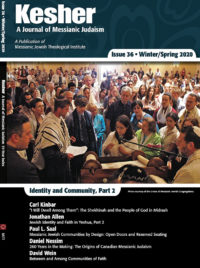IMPORTANT ANNOUNCEMENT FROM THE KESHER STAFF
The upcoming Fall/Winter issue of Kesher: A Journal of Messianic Judaism will be the final print edition. This is part of a larger effort to modernize and streamline our operations, ensuring that we use our resources wisely and continue to publish a high quality journal. If you purchase a digital subscription now, we will send you a copy of the final print edition for free! (Just be sure to send your name and mailing address to admin@mjti.com.)
For those of you who have current print subscriptions, you will receive the upcoming issue as part of your subscription. If your print subscription remains current, then we offer you the opportunity to designate the remaining funds toward a donation to Kesher, apply the funds to a new online subscription or receive a refund.
We greatly appreciate your continued support of Kesher. If you have any questions, please call 614.519.1162 to discuss.

